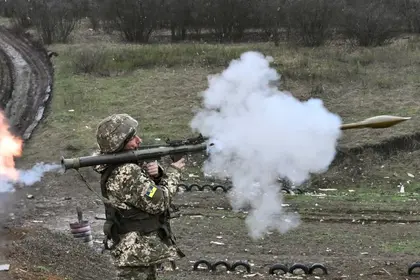Ukrainian infantry raiding across the Dnipro River, near the southern city of Kherson, was locked in firefights on Monday with elements of at least two Russian conventional brigades. Pro-Moscow spokesmen said the bridgehead would soon be crushed, whereas Kyiv officials claimed the diversion tactic had exposed previously hidden Kremlin artillery to counterstrikes.
Small boat teams from Ukraine’s elite 73rd Marine Special Operations unit were, according to Russian sources, being pressed into a shrinking perimeter around the south end of the demolished Antonivsky bridge, a span across the Dnipro destroyed by retreating Russian troops in November.
- Check the most up-to-date Ukraine news reports from today.
- Check the most up-to-date Ukraine news reports from today.
JOIN US ON TELEGRAM
Follow our coverage of the war on the @Kyivpost_official.
Ukrainian military spokesmen have confirmed special operations troops operating on the left bank of the Dnipro River since at least May, among them the 73rd, Kyiv’s premier small boat commando unit.
Russian military information platforms claimed Kremlin troops backed by tanks and artillery were systematically clearing out Ukrainian infantry on the “Russian” side of the river over the weekend, and some sources asserted the Ukrainian force was completely destroyed by Sunday.
Pro-Russian blogger Yury Podolyaka in a Sunday situation estimate said: “Communications with this region is, unfortunately, not stable, but based on what guys that are there have told me, the enemy is regrouping, and it’s not clear whether it’s evacuating this bridgehead totally, but our guys are pressing them… and right now I don’t have any hard information about what’s going on.”

Latest on Russia’s Intransigence to End War Against Ukraine
Russia’s 127th Brigade was leading the attack on Ukrainian forces, he claimed. Other pro-Moscow information platforms said a Russian marine infantry unit, backed by tanks and artillery, was also participating in the counteroffensive. The British Intelligence Update on July 1 said defending Russian forces in the area included elements of the 7th Guards Air Assault Division.
Russian media on Thursday reported two powerful weapons not normally employed by Kremlin forces against light raiding infantry teams – TOS flame thrower rocket launchers and massive Iskander surface-to-surface missiles – had pounded the Ukrainian “bridgehead.” Russian air strikes also were reported, but some Russian military information platforms complained the Russian air force bombs and missiles had missed.
The terrain around the south end of the destroyed Antonivsky bridge is swampy, heavily wooded, and thick with summer cottages, orchards and gardens. Ukrainian light infantry from the 73rd and possibly other units intensified raids across the Dnipro to the sector in May against weak Russian opposition.
By late June, a 5- to10-kilometer-wide belt of the left, formerly Russian-held Dnipro River bank in the vicinity appeared almost fully under Ukrainian control, with Russian boat patrols hitting ambushes and, according to civilian social media, Ukrainian small boat teams moving freely back and forth across the river.
On Saturday Russia’s Defense Ministry, without offering evidence, claimed all Ukrainian forces in the vicinity of the Antonivsky Bridge “had been totally destroyed.” Ukraine Air Force spokesperson Yuriy Ihnat confirmed the Iskandar had been fired, but Russian claims the strike destroyed Ukrainian troops in the vicinity were overblown.
Natalia Humeniuk, senior spokesperson for Ukraine’s Joint Forces South, in a Saturday statement, said that “serious battles are in progress” on the left bank of the Dnipro opposite Kherson, and that Armed Forces of Ukraine (AFU) long-range, counter-battery artillery was taking advantage of Russian attempts to clear the “bridgehead,” by hitting shorter-ranged Russian howitzers and cannons brought to the battle.
Russian artillery losses in recent weeks have been at a wartime high averaging around 25 to 30 systems lost per day, with even higher peaks registered during the kick-off of Ukraine’s summer offensive on June 6-10, and over the weekend on July 1-2, Icelandic military data analyst Ragnar Gudmundsson reported in open-source findings.
Ukraine’s Army General Staff (AGS) in its July 3 morning situation estimate made no direct reference to fighting along the Dnipro River floodplain beyond stating that Ukrainian reconnaissance had observed Russian attempts to regain lost ground in the Kherson sector.
The AGS July 3 estimate of Russian equipment destroyed over the previous 24 hours claimed Kremlin artillery losses were continuing apace with 32 Russian howitzer or mortar systems, and four rocket systems put out of commission or captured by AFU units.
You can also highlight the text and press Ctrl + Enter










